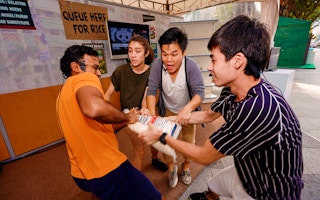Global conservation organisation World Wide Fund for Nature (WWF) on Thursday kicked off its Earth Hour 2015 campaign in Singapore with a climate change trail that offers a first-hand experience of climate change impacts such as rising temperatures, extreme weather events, and food scarcity.
The trail, located on the pedestrian walkway outside Singapore’s ION Orchard mall, is made up of three booths that create three possible scenarios for visitors: A housing flat facing a heat wave where temperatures have soared to 42 degrees Celsius, a shelter that offers refuge from torrential rains and floods, and a supermarket where scant food resources are extremely expensive.
Videos in each booth show news coverage on the conseqences of these changes in climate, including a rise in vector-borne diseases such as malaria and dengue fever and more frequent spells of the haze.
At the booth representing an understocked supermarket, actors regularly re-enact a scuffle over whatever food is available.
Elaine Tan, chief executive officer, WWF Singapore, said in a press statement that the experiential trail “is both a presentation of how disrupted daily life could be if we do not take care of our planet, and a reminder of how every person is critical in changing climate change”.
While these booths project possible scenarios in the future, the effects of climate change are already being felt around the world today.
In the past few weeks, for example, more than 600 tonnes of fish have died due to a plankton bloom, dealing a heavy blow to the Singapore’s fish farming industry.
Plakton blooms deplete oxygen from the water, causing other organisms to suffer. They are caused by higher temperatures and lower than average rainfall levels, said experts.
“
The Climate Change Trail is both a presentation of how disrupted daily life could be if we do not take care of our planet, and a reminder of how every person is critical in changing climate change.
Elaine Tan, chief executive officer, WWF Singapore
Sudhanshu Sarronwala, Earth Hour’s Global Chair, added that natural disasters such as Hurricanes Katrina and Sandy in the United States, and Typhoon Haiyan, which struck the Philippines in 2012 and left more than 6,000 dead, are “happening with alarmingly increasing intensity and frequency.
“This is indisputably a facet of climate change,” he said.
Noting that this year would be “pivotal” for addressing climate change as world leaders are expected to ink a global agreement on reducing greenhouse gas emissions by December, Sarronwala stressed that individuals had the potential to send a strong message to policymakers on the outcomes they wanted from the discussion.
At the trail, members of the public can also pledge to change their behaviour and take actions to reduce their environmental impact.
Steps suggested by WWF Singapore include refusing plastic bags, recycling e-waste, increasing air conditioning temperatures, turning off switches, and donating to WWF campaigns.
“If everyone made that behavioural switch to support our five key actions, we can change climate change today,” said Tan.
Earth Hour started in 2007 in Sydney, Australia, as a symbolic event in which individuals, companies, and even city buildings switched off their lights for an hour. It has since grown to engage people and businesses in more than 7,000 cities and 162 countries worldwide.
Earth Hour’s scope has also grown to include a crowd-funding platform to raise funds for conservation and climate change projects and lobbying for climate-friendly legislation worldwide.
The campaign’s success stories include successfully banning plastic bags in the ecologically fragile Galapagos Islands last year and raising US$106,000 to protect endangered species such as the Far Eastern Leopard in Russia.
Separately, WWF Singapore on Thursday also launched a crowd-funding initiative on the Earth Hour platform to raise US$30,000 to support efforts to monitor and protect Sumatran Tigers in Indonesia by installing satellite-enabled camera traps in tiger habitats.
“After nine years of building awareness around environmental issues, we have to take people beyond the hour,” Tan told Eco-Business. She said the main message of this year’s campaign was that tackling climate change is “about breaking it down into small lifestyle changes” and sensitise the public to the consequences of failing to do so.
Earth Hour’s Climate Change Trail runs till 28 March. It is open from 5:00 p.m. - 8:00 p.m. on weekdays and 2:00 p.m. - 9:00 p.m. on weekends.

















